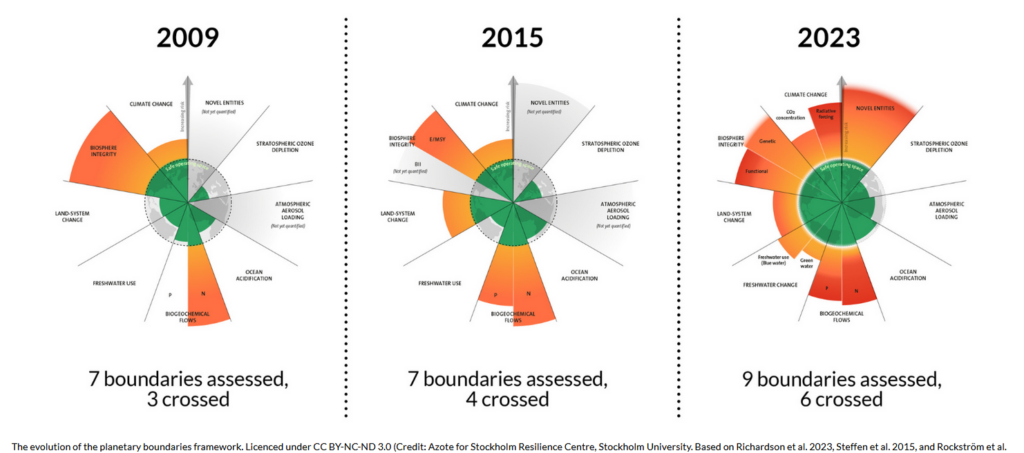Corporate sustainability risks & trends for 2024
Rising challenges
Before the Covid Pandemic end to 2019 there was solid progress for Sustainability in the corporate world. Awareness around climate change, biodiversity loss and the importance of social impact was improving. The risk and the opportunity of adding sustainability into decision making and performance measurement was knocking more regularly on the board room door and People and Planet were starting to find a more regular place at the same table as profitability. But then close behind the arrival of COVID a multitude of other inflection points have been triggered, with all sectors of work having to handle unpredictable risks arriving at faster rates.
- More Planetary Boundaries breached*.
- AI generated misinformation and disinformation makes trust worthy data harder to find.
- Market volatility is commonplace.
- Political and Geo-political influence.
- Inflation.
- Cost of living.
- War.
The list is long and relentless, with macroeconomic headwinds that historically have come once or twice a generation lining up in their droves.
For corporate sustainability, the challenges rose most fervently in 2023. There was increasing criticism that sustainable thinking was impeding business performance. If you were considering environmental or social impact in your decision making the you were denting the profitability. This has been most formally demonstrated in the United States with legal and incentivised anti-ESG measures in place in more than 18 states. In times of macro-economic challenge, the need for better rates of return in shorter time periods with quick fix thinking is exacerbated and this exacerbation is directly juxtaposed to the long-term strategic approach that sustainability needs.
Momentum and hope
With any substantial change there are negative reactions to the pro-activism before genuine progress and equality can be made. While the doom and gloom list is long, I believe the sustainability backlash has peaked and is passing.
There are few topics more entangled than Sustainability. It is across business, science, law, politics, consumerism, popularism, public opinion and uncertainty. It is far more consistent and carrying far more weight as part of decision making at so many more parts of the business value chain.
Data consistency, partnerships, sharing, taxonomies, regulation, legislation, technological and biological innovation are more established and there has been a tectonic shift in the direction of capital investment. Those who doubt the climate crisis or the importance of social impact are starting to acknowledge the commercial reality. There’s growing evidence that sustainability practices are linked to financial success with studies from the likes of McKinsey & Company showing a 3% to 8% increase in EBITDA (Earnings Before Interest, Taxes, Depreciation, and Amortization) for those firms embracing sustainability practices.
Sustainability themes: my current top 5
- Scaling renewables – the urgency of addressing climate change and meeting Net-Zero commitments made, plus falling costs and increasing government incentives are driving the rapid expansion of renewable energy capacity.
- Regulation and legislation – There are more consistent standards for disclosing sustainability information. It will remain fragmented through 2024 and 2025 but mandatory requirements are starting to bed in with spreading influence.
- Data tsunami – Consistent, standardised data is going to take time to evolve but the volume of data available now, assisted by AI evolution is huge. To mitigate risk, adhere to standards and meet commitments that have been made every sector must make sure their data management and related business processes can adapt and react to unpredictable risk.
- Technological and biological technology innovation – These are advancing Environmental (e.g. renewable energy, energy efficiency, pollution control, carbon capture, sustainable materials…) Social (e.g. Precision Agriculture, Waste Reduction and Recycling, Healthcare, Social Impact Investment…) and Governance Benefits (e.g. Transparency and Accountability, Risk Management, Sustainable Supply Chains…) and offering a powerful toolkit for companies to improve their sustainability performance.
- Consumer behaviour and social expectation – Increasing expectations on products and services to prove awareness and social conscience is playing a more important role in consumer and B2C and B2B decisions with supporting evidence of this showing through in behavioural science.
*Side knowledge bite
First Launched in 2009, the planetary boundaries concept presents a set of nine planetary boundaries within which humanity can continue to develop and thrive for generations to come. Crossing these boundaries increases the risk of generating large-scale abrupt or irreversible environmental changes. Drastic changes will not necessarily happen overnight, but together the boundaries mark a critical threshold for increasing risks to people and the ecosystems we are part of.

For more information on any of the topics discussed, please contact George Roffey, Chief Sustainability Officer at Centrus




 Back to Insights
Back to Insights
